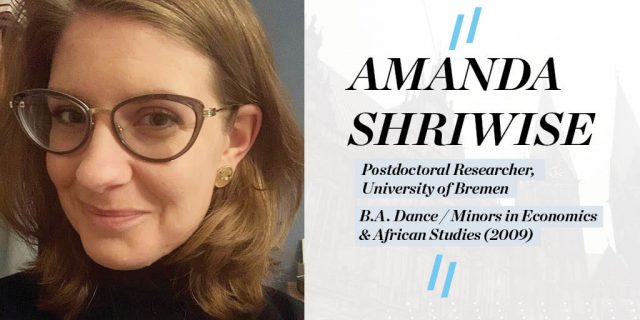
Why Amanda’s a Hawk to Watch:
If you were able to look into the future 10 years ago and see yourself today, what would you have thought? Would you be awestruck by all that you’d accomplished in such a short period of time? Think of all the work still to be done? Both? As an undergraduate student, KU Dance alumna Amanda Shriwise would have never believed that, by age 33, she’d have worked for both the U.S. Department of Health and Human Services and the World Health Organization, and on top of that, be living and working in Germany. But life has a way of taking unexpected turns. Now, as a postdoctoral researcher at the University of Bremen, Amanda is seeking to understand the impact of colonial legacies on the Global South to support efforts to expand access to resources and strengthen communities in which basic income and healthcare is often severely limited.
At first, one might imagine dance and academia on social protection to be worlds apart. While it’s true that there are visible difference between her research and background in dance, for Amanda, the skills gained and lessons learned as a dance major transferred to her current work in several critical ways: learning to push herself, dealing with and growing from rejection, and realizing that progress is always a process, whether you’re refining your approaches to a research project or footwork in ballet.
Learn about Amanda’s travels across the globe, how eye-opening journeys at KU and abroad inform her current research, learning to balance work and life, her hopes for the future (spoiler: it includes getting a dog!), and why she’s convinced that humanity stands the best chance of achieving its shared goals when people learn to empower one another. Discover why Amanda’s a Hawk to Watch.
Tell us in a sentence or two what you do for a living:
I am a postdoctoral researcher at the University of Bremen in Germany working on a project that seeks to understand how colonial legacies have impacted social protection arrangements in the Global South. Social protection, or ensuring access to basic income and healthcare, is critical for improving development and well-being, particularly for those experiencing extreme poverty and vulnerability.
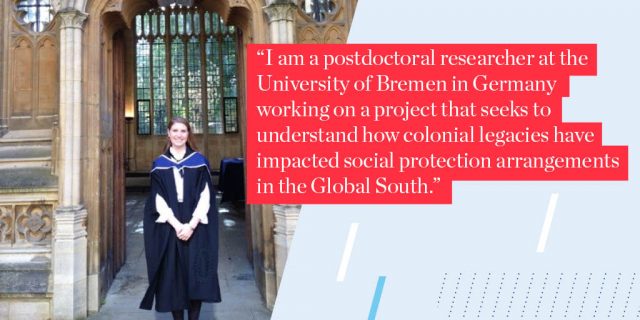
Today, only 27% of the world population has adequate social protection and more than half have no coverage at all. To address this, the United Nations (UN) has recognized the importance of improving social protection in order to end poverty, promote gender equality and empower women and girls, and reduce economic inequality in its new Sustainable Development Goals. The findings of this project aim to better understand the impact of colonialism across the Global South – where social protection is often the lacking or absent altogether – in order to better inform and support efforts to extend and enhance social protection coverage worldwide.
How did you end up doing what you do? Was there a certain moment when things came together? Or was it a longer journey?
It continues to be a journey full of surprises, with several critical moments and junctures. During the summer of 2006, I left the United States for the first time and traveled to Tanzania, and my desire to examine societal issues such as health and education on a global scale originated there. This experience opened my eyes to the ways in which the effects of poverty and deprivation are more than material; the right to dignity and ensuring that individuals, families, and communities are empowered is critical to preserving and respecting the rich histories, cultures, languages, and traditions of countries like Tanzania. Improving and securing livelihoods by improving access to quality education, health care, and decent work appeared to be a necessary first step to substantiating human rights and making concepts such as equal opportunity and self-determination a reality. When I returned to Lawrence, I pivoted from a focus on the sciences in preparation for medical school to a focus on the social sciences to better understand these issues.
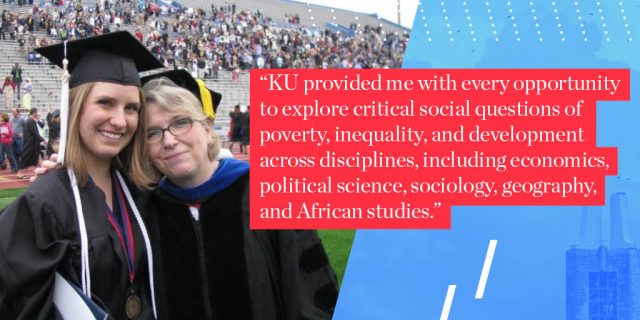
KU provided me with every opportunity to explore critical social questions of poverty, inequality, and development across disciplines, including economics, political science, sociology, geography, and African studies; I was even afforded the opportunity to attend a specialized seminar on global poverty with then-Chancellor Robert Hemenway in the spring of 2008. I remember Chancellor Hemenway’s deep commitment to promoting an awareness of global issues among KU students, including the UN’s previous Millennium Development Goals. His participation in the World Economic Forum in Davos and connections with KU alumni across the globe only reinforced his passion for these issues and provided me with a window into how I might become part of this global community of Jayhawks. Having the opportunity to study abroad with Dr. Mary Klayder in both Costa Rica and the United Kingdom taught me how to put these desires into practice. She provided me with a foundation for how to process and understand my experiences whilst traveling living abroad, where I have been now for almost a decade.
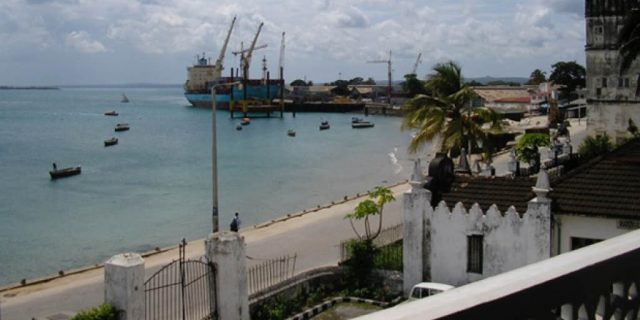
While the social sciences provide critical analysis and insight into the nature and causes of social problems such as a lack of income, health care, or education, they did not contain a roadmap for what I, as a young undergraduate, could do about them. This question was one that I wrestled with as a Co-Director at the Center for Community Outreach at KU. What I learned from that role – and what continues to drive me – is that there is not only so much to do but so much that can be done. Strong communities – whether they consist of indigenous peoples, lifelong local residents, international students and/or individuals and families with transnational roots and lives – find ways to identify and work together towards shared goals with creativity, ingenuity, and determination.
There is no singular or ‘right’ way to build a sense of community. Having the opportunity to watch, learn, and facilitate engagements towards this end in my role at CCO was interesting, inspiring, and full of possibility. CCO’s programs contribute to meeting some of our most basic human needs and desires – such as a meal on the table as supported by Jubilee Cafe, self-expression and creativity with Music Mentors and Create, health and wellness through Hawks for Health, support and guidance along the way through Mentors in the Lives of Kids (or ‘MILK’), and for promoting connection through language and literacy with Project Bridge – for all in the Lawrence community, regardless of background or place of birth.
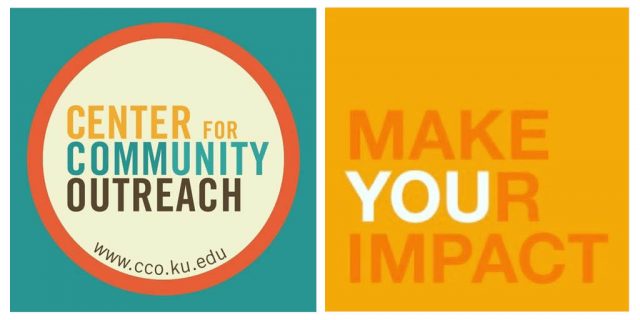
At its best, the kind of volunteering that CCO and organizations like it promote is about more than charity; when performed as an act of service, it provides an opportunity to consider what our shared goals might be, to think about and question how we can best support and empower each other in achieving them, and perhaps most of all, to participate in their achievement together. This kind of civic engagement helps us to move beyond screens and ourselves and to see the world through the eyes of others in order to connect in a meaningful way – a critical and timely component of undergraduate experience and education as students are learning to live away from home, often in a new place, for the first time.
These connections are powerful, and they are why people continue to say that they receive more than they give when engaging in service, whether by profession, volunteer work, or one-off acts as simple as helping litter find a trash bin. It is not the size of the act but the doing itself that helps to create this kind of connection. These acts, and the communities they ultimately build and inspire, are critical to laying a strong and civil foundation of mutual respect and understanding upon which to have more difficult political discussions and debates. I believe that our ability to make political and social progress rests largely on our ability to lay this shared social foundation together, and for this reason, CCO was a formative part of my time at KU.
What do you feel is your biggest achievement so far?
On International Women’s Day, I successfully defended my dissertation in order to receive my doctorate degree (or ‘DPhil’) in Social Policy at the University of Oxford. The dissertation was on the use of social policy as a tool of foreign policy. In total, it took me about five years to complete the research and write up the findings, though I was a doctoral student for a while longer and also Master’s student at Oxford before that.
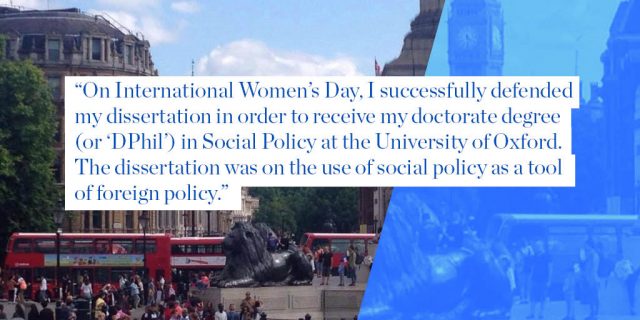
However, my greatest achievement while at Oxford is the sense of community we were able to create both within Kellogg College when I served as its Middle Common Room (MCR) President and also across the MCRs of all of the Oxford colleges in 2012. Several of the MCR Presidents even teamed up to take a trip to Istanbul together, which was good fun.
What’s your lowest career moment and how did you pick yourself up and move on?
My work is integral to who I am, which somewhat dangerously obscures the need for a work-life balance. My lowest career moment was not marked by an event so much as it was a phase leading to burnout, from which I learned that substantial amounts of stress in my professional life, personal life, and living situation was more than I could sustain. Stress on one, or even two, of these fronts is manageable, and arguably somewhat normal; significant stress on all three for an extended period of time is, for me, a recipe for burnout.
To recharge, I had to remind myself that I am more than what I do and find a balance between acknowledging mistakes and being compassionate towards myself. I am incredibly fortunate to be short on neither friends nor ambition; the ambition helps, but my friends have made my world brighter on all fronts. I learned that however behind I am at work, I am probably behind on tending to my life and the people I love more, and when I feel frustrated at work, it usually means I need to focus more outside of the office than within it.
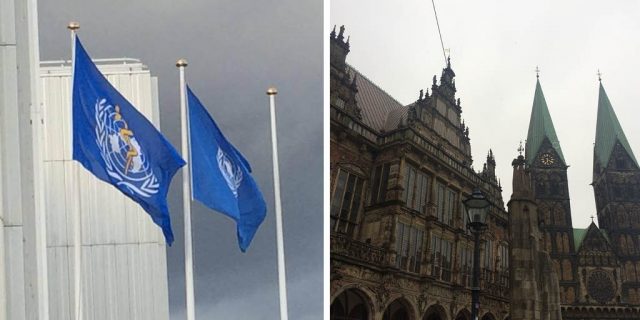
Where do you hope to be in 10 years?
I would like to be playing an active role in strengthening communities and enhancing social protection globally, which could take shape in a multitude of ways. When I was an undergraduate at KU, if someone had told me that by 33 I would have worked for both the U.S. Department of Health and Human Services and at the World Health Organization and be working and living in Germany, I would not have believed them. My path was possible due to hard work and preparation in combination with a willingness to wait for and embrace the right next step when it appeared – not to mention an outstanding network of teachers, mentors, family and friends. On a personal front, it’s a goal of mine to have a more permanent place to live, and I would love to have a dog.
What do you know now that you wish you could tell your 18-year-old self?
Learning what makes you happy is neither frivolous nor a waste of time. Taking time to rest, revive, and enjoy life will not only be equally as critical to your success and has intrinsic value. If you aren’t working to create a world where art, beauty, love, laughter, joy, and fulfilment is possible – including for overambitious workaholics such as yourself – then what is the point? Why do so much ‘doing’, if it does not make the ‘being’ a little easier, a little better?
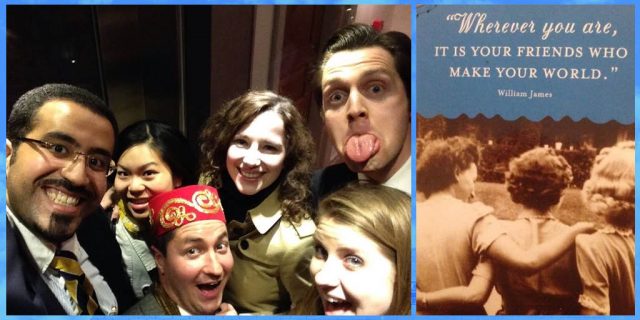
When done right, aging is transformative and progressive. During this process, you will fail, and you will, at times, have to learn the hard way. Sometimes, this is your own fault. Sometimes, what feels like failure is really life falling apart because you are in the process of outgrowing your surroundings. Try to discern the difference between the two; when in doubt, consult those you trust.
What’s your best career pro-tip?
Be kind and try to have some fun along the way. In meetings, pay as much attention to what is not being said or done as what is; what is actually going on is usually somewhere in between. Don’t ever let anyone control your story or define who you are, and beware of anyone who tries. When faced with a chance of a lifetime, take it.
How did your KU degree prepare you for your current job?
My degree in Dance was outstanding training for academia. Ballet prizes a level of perfection that few can reach, which resembles academia in several ways. As a young ballerina, I was lucky; I learned how to take control of the way I internalized the seemingly unachievable criteria for success that were visually held up in front of me every day in the ballet studio in a way that helped me to identify clear steps for growth rather than to feel powerless or discouraged.
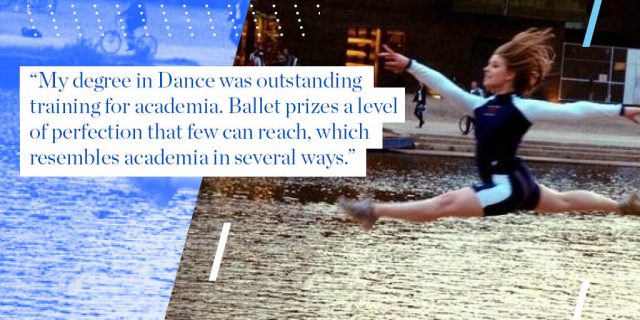
I also learned that it was a waste of energy to compare myself to others and that I was far better off learning to develop healthy ways of competing with myself, which was good training for any highly competitive environment. Ballet also taught me how to deal with rejection early on. I did not always get the part that I wanted or get admitted to every summer program I auditioned for, and if I wanted to change that, it was best to focus on how and where I needed to improve rather than to waste time taking it personally – a very transferable insight when submitting and reviewing academic articles for publication among other aspects of life.
Intellectual development is also a process; it takes time and is often not linear. In the same way that the first ballet class after a long break is almost invariably better than the second or third, time off often helps to let the things stewing in the back of one’s head come forth and then good writing comes. The hard, conscientious work of going to ballet class every day or doing a thorough literature review is far less fun than those good, well-rested days, but it is what provides one with the skill and capacity to trust oneself when taking giant leaps later. Above all, my dance training taught me that hard work should ultimately be a labor of love and that perseverance and delayed gratification are required to create most things of lasting value; academia is not dissimilar.
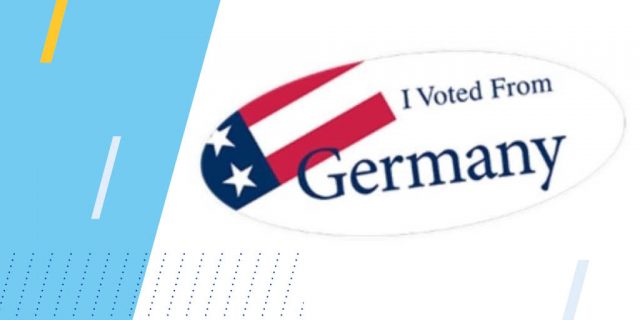
What do you do after you’ve clocked out?
On a daily basis, anything I can to relax and revive my brain – usually some combination of sleep, exercise (a run if I must, ballet or yoga if I can), podcasts, and reading. As an American living overseas, I also spend a fair amount of time on various bureaucratic exercises ranging from filing for residency permits to opening bank accounts to learning how to file taxes while abroad. On a more fun note, I have also been spending quality time with Duolingo, as I am desperately trying to improve my rather basic French and what could generously be described as very limited German. When I have time, I love going to the ballet and to art galleries, being outdoors when the weather is nice, and I try to make time for drinks, meals, and trips to see friends and family whenever I can.
What is a fun fact about you that surprises people?
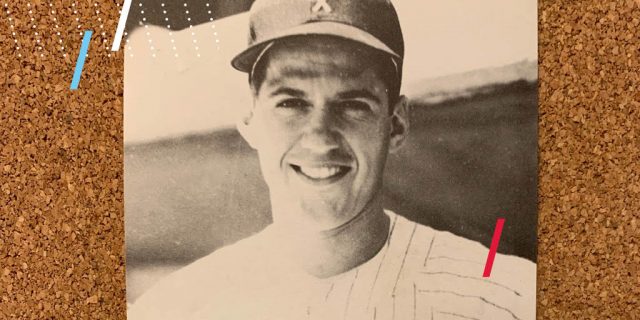
I was named after a jazz song called ‘Mandy’, which is somewhat amusing given how much more comfortable I am with structure than spontaneity. However, my grandfather, Rocky Krsnich, loved jazz music. Someone once told me that one’s name is the first gift they are given, and I am grateful that mine reminds me of him.
Be like Amanda. Make your impact. For more information, visit the Department of Theatre & Dance, the Department of Economics, the Department of African & African American Studies, and the Center for Community Outreach at the University of Kansas. Learn more about the University of Bremen.
Hawks to Watch are disrupters. They’re poised for greatness, inspiring their colleagues and excelling in their professions. Basically, they’re killing it. Having recently graduated, they are just starting to leave their mark and we can’t wait to see how their story unfolds. These Jayhawks span all industries including business, non-profits, tech, healthcare, media, law and the arts.